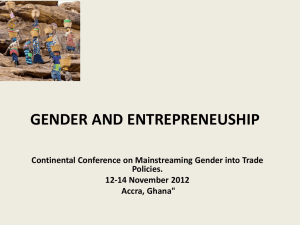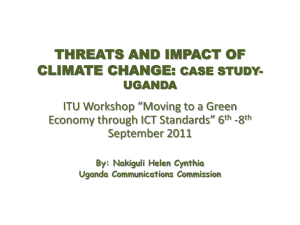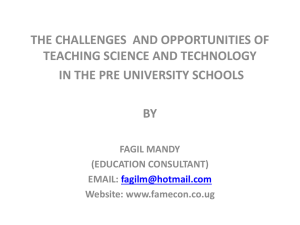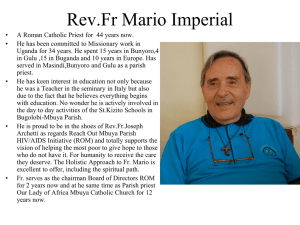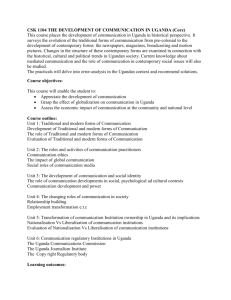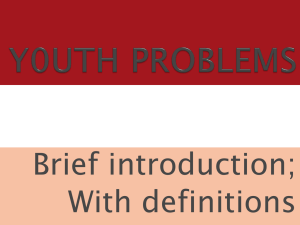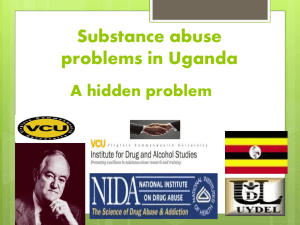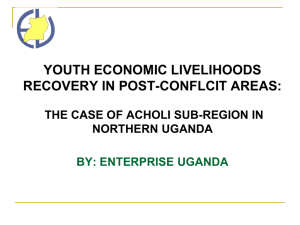Cohere Uganda-Coalition progress presentation
advertisement
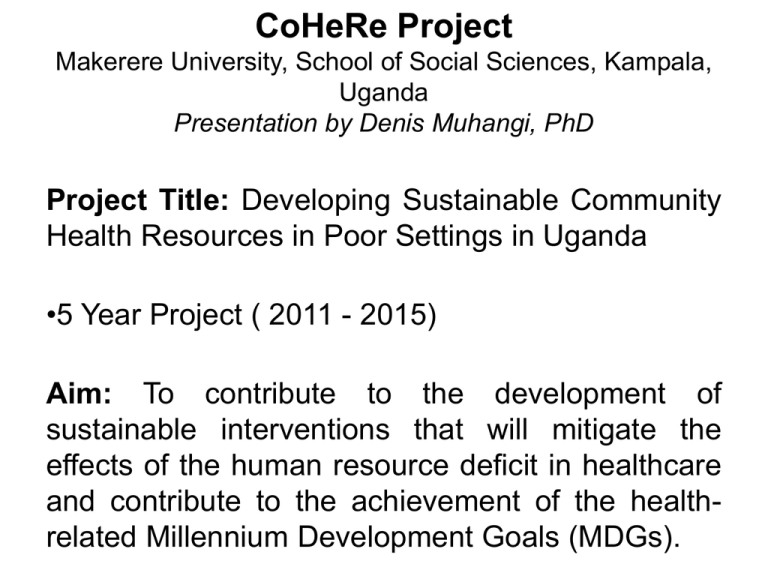
CoHeRe Project Makerere University, School of Social Sciences, Kampala, Uganda Presentation by Denis Muhangi, PhD Project Title: Developing Sustainable Community Health Resources in Poor Settings in Uganda •5 Year Project ( 2011 - 2015) Aim: To contribute to the development of sustainable interventions that will mitigate the effects of the human resource deficit in healthcare and contribute to the achievement of the healthrelated Millennium Development Goals (MDGs). Focus of the Project • Identifying locally existing resources (social, economic, cultural, etc.) that can be used to promote better health • Utilize existing community resources to: – Spread health information – Encourage health promoting behaviors – Bring vulnerable community members into better contact with existing health services. • Develop local capacity for applied public health related social science research. • Generate lessons to promote low-cost community based health approaches. Focus of the Project -2 1. Exploratory Anthropological Research on: i. Indigenous community information resources ii. Social processes and spaces that generate and sustain social capital as a health resource iii. Existence and functioning of informal social support mechanisms Focus of the Project - 3 2. Small-scale pilot interventions based on the research findings on the above three topics: •“Social Groups for Health” Initiative – work with pre-existing groups to improve household health •Referral vouchers – to promote care seeking from formal health facility •The “grapevine” - spread health information through informal channels •Health Improvement Modelling – through support towards a community latrine Policy Relevant Questions • How can local/indigenous social roles, networks and information processes be used to transmit health information to communities, skills, and behaviours, and link vulnerable community members to existing health resources? • What motivation mechanisms for voluntary behaviour in the community can be harnessed for replication to support health related interventions? Progress • Main data collection phase completed • Data analysis and writing up on-going • Small-scale interventions being implemented • Supplemental and monitoring data being collected Main stakeholders Primary stakeholders Secondary stakeholders Tertiary stakeholders Community members (men, women, youth, children) Community Leaders (LCs, Women ….) Community groups (CBOs, SACCOs) Traditional/cultural leaders (Buganda Kingdom officials, clan heads) Religious leaders Health workers Village Health Teams (VHTs) Traditional healers and TBAs Schools District local government (Health Department, Community Development Department) Ministry of Health (Directorate of Community Health, Environmental Health, MIS) Uganda National Health Research Organization National Level Politicians (Area MPs) Researchers Academicians The Media NGOs, CSOs (AMREF, KOICA) KTNet Donor agencies Stages of the project at which stakeholders been involved • Project conceptualization and design • Data collection • Pilot intervention Institutions with the responsibility of packaging and disseminating research in Uganda • Universities (departments and schools) • Research institutes (MISR) • Think tanks (Centre for Basic Research, ACODE) Stakeholder engagement strategies • • • • • • • Meetings Workshop One to one formal and informal talks Participation in on-going events Through the pilot intervention Newspaper article Blog article Key messages & the findings • Individuals and households can play a key role in supporting each other to address health problems Much use is already made of a strong underlying sense of local reciprocity and solidarity during funerals, weddings, farming, etc. • Many perceived health problems could be solved by strengthening linkage with formal health facilities – many residents believe they have syphilis [kabotongo], though they have never tested for it. Key messages & findings • There are numerous local groups/ processes/ venues that bring people together and serve as sources of information and social influence. These could be utilized, but this needs to be ‘from below’ as appropriation from outside has a negative effect on local solidarity and sustainability – Groups that have been formed with strong external influence have fractured pre-existing social relations or ended in conflicts Key messages & findings • Small motivations and inputs from external agents can spark off far reaching effects and changes – following construction of the communal latrine, local leaders are demolishing unhygienic latrines KT related Challenges Encountered • Our approach – subtle approach, intended to be bottom-up and low–cost, so not keen to portray ourselves as a project • Primary researchers (PhD candidates) not on ground most of the time – busy writing up their papers/theses • Still at data analysis and intervention stage – results and lessons not yet concretized and agreed How has your project over come these challenges? • Tried to do more translation with the community itself without involving so much the media Opportunities to overcome the challenges • Planning to use every opportunity with the PhD candidates when in the country KT Products • One dissemination meeting with local stakeholders in Luwero • Presentation at conference in Tanzania (November 2014) • Newspaper article • Blog article Additional KT products and activities for 2015 and beyond • • • • • Dissemination meetings More newspaper articles More blog articles Policy briefs Media briefings Support Needed • Training in media engagement • Training and editorial support in writing policy briefs



